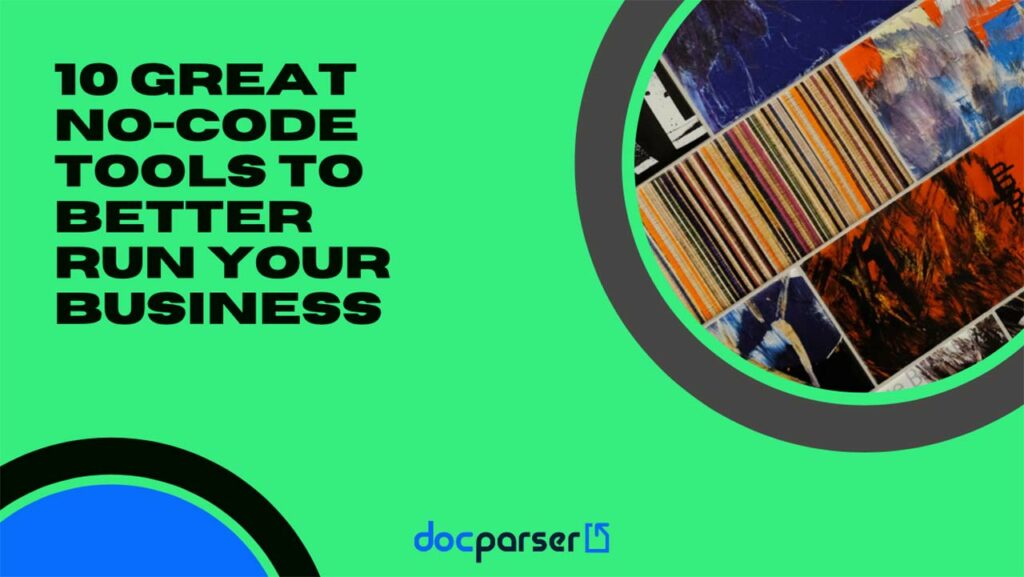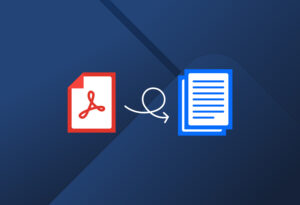Building tools, websites, and applications used to be a long and costly endeavor that only software developers could carry out. But things are much different today. In fact, the business world is seeing a surge in low-code and no-code tools. You can easily find tools for building websites and apps, managing your team, or automating tasks — all without having to write a line of code.
These tools are especially convenient and cost-effective if you don’t have a software developer in your team. And if you do, they can use low-code tools to save time and focus on more complex tasks. In fact, no-code tools can potentially reduce development time by 50-90%.
However, choosing the right tools for your needs can be a bit of a challenge since there are so many of them. So we have made this list of 10 low-code and no-code development tools you can use without needing any technical knowledge.
10 Great No-Code Tools to Run Your Business
1. Docparser
Countless businesses struggle with manual data entry. Not only it costs time and money, but it’s also error-prone. Docparser is a document parser that uses Optical Character Recognition (OCR) to identify and extract data from documents – think invoices, purchase orders, bank statements, forms, HR documents, etc. This makes Docparser a natural fit for any no-code tech stack that requires OCR.
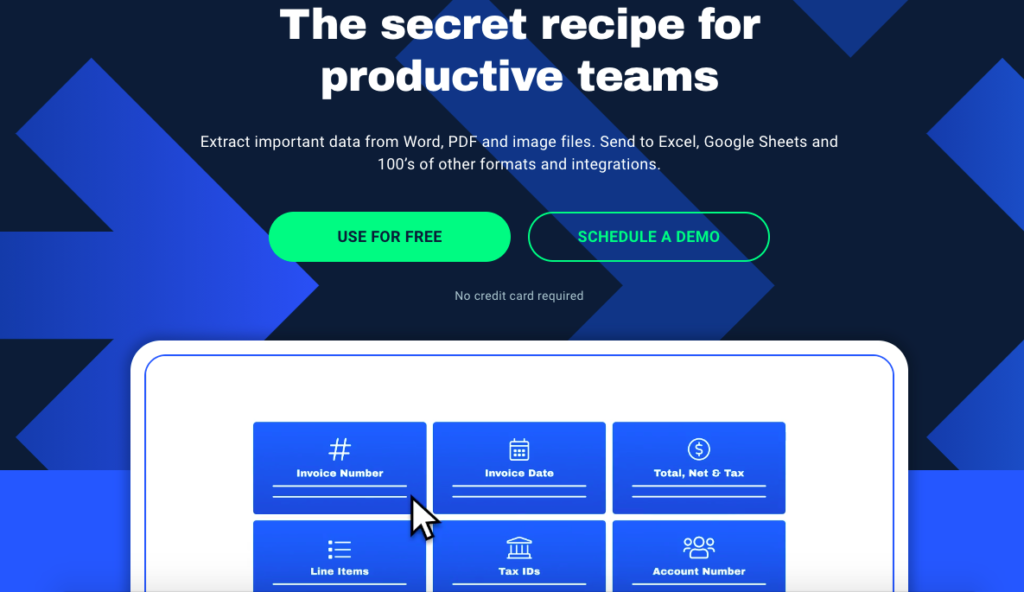
You can use Docparser use to:
- Extract data from documents with 100% accuracy
- Use pre-built templates to create different Document Parsers for all your documents
- Build custom Parsing Rules to tailor data extraction to your unique needs
- Send the extracted data to a cloud application via Docparser’s integrations
Why you should try Docparser:
- Cut down countless hours of tedious data entry to minutes
- Eliminate manual data entry errors
- Employees can focus on more impactful work
- Improve decision-making with error-free data
You can sign up for a free Docparser account and try all of the features.
2. Mailparser
Mailparser, our sister company, offers a similar tool. It’s an email parser that extracts data from emails with 100% accuracy. You can configure Mailparser to identify and extract data from an email’s subject line, body, sender, and attached files – with no need for coding, of course. So if you receive large numbers of emails regularly, and you need to move the information inside to Excel, a CRM, ERP, or any kind of system, you probably find yourself spending a lot of time and effort on manual data entry. Mailparser solves this by extracting data and sending it where you need it to go.
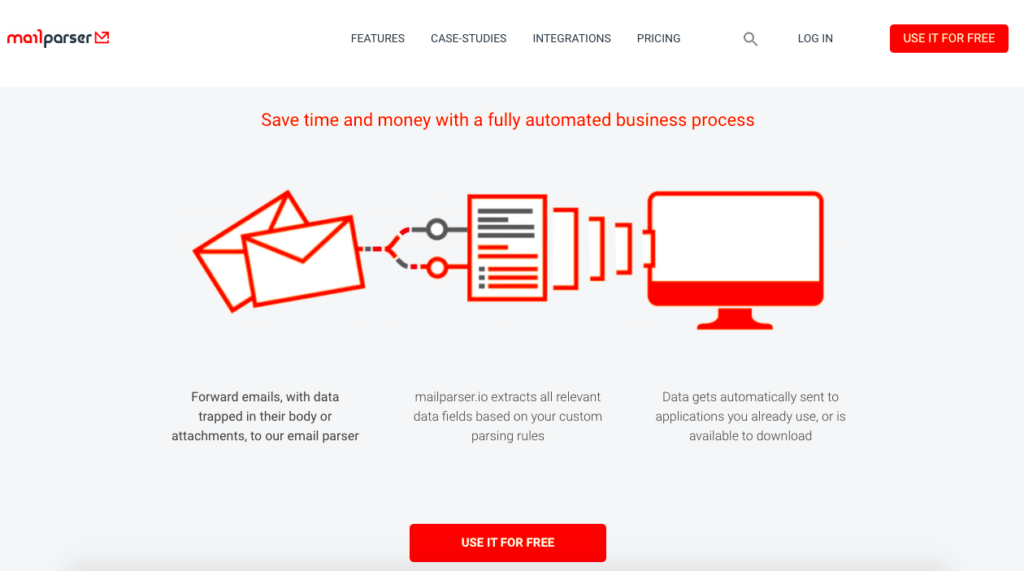
You can use Mailparser to:
- Extract data from an email’s subject line, body, sender, and attached files.
- Extract data from a large number of recurring emails in minutes
- Send email data to a cloud application you use like Salesforce or Zapier
- Download email data to an XLS, CSV, JSON, or XML file
Why you should try Mailparser:
- Cut down the costs of data entry
- Receive accurate and structured data in your preferred app or system
- Eliminate time-consuming and error-prone data entry
- Focus on more valuable tasks
Mailparser has a free plan you can sign up for to try all features from the get-go. You can later upgrade to a paid plan that fits your email parsing needs.
3. Webflow
Webflow is one of the most popular no-code tools for building professional-looking websites and platforms. Think of Webflow as a tool that bridges content management and visual design. Whether you are a designer, developer, or a non-technical person, you will find yourself having fun creating layouts and adding content to bring your site to life.
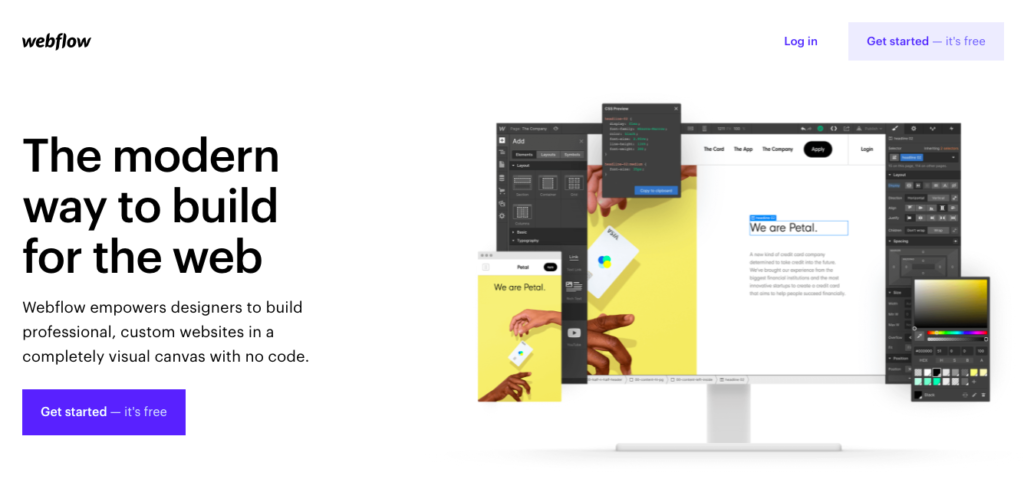
You can use Webflow to:
- Build professional websites with No-Code
- Add dynamic content
- Add a custom search experience
- Easily tweak and update your design and content as you go
- Display user-generated content
- Connect other services to your site via 750+ integrations
Why you should try Webflow:
- User-friendly
- Infinite design possibilities
- SEO-friendly
- Scalable and reliable infrastructure
- Extensive library of tutorials and other resources
You can use Webflow to work on two projects (websites) for free and as long as you want. The paid plans are divided into site plans (site or eCommerce) and account plans (individual or a team).
4. Bubble
Think of Bubble as Webflow but for multi-user web applications. This tool allows you to completely bypass coding by using its drag-and-drop editor. The app you build can reliably display user-generated content as well as data from Google, Stripe, and other services.
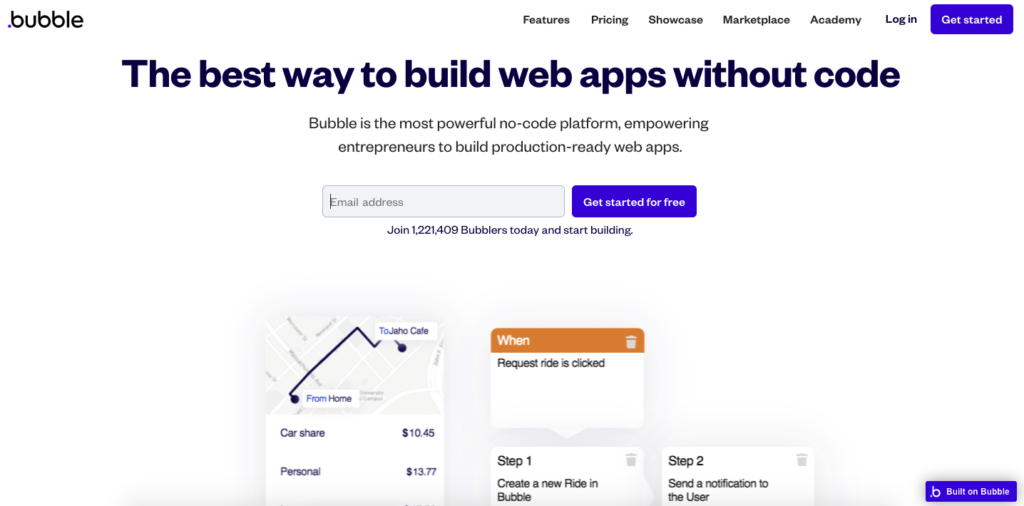
You can use Bubble to:
- Build web applications without writing code
- Test app ideas without incurring a large cost
- Scale your app without worrying about infrastructure
Why you should try Bubble:
- Intuitive visual interface
- Vast customization possibilities
- Large library of templates
- Fantastic tool if you want to create apps without hiring a developer
- An active user community
You can use Bubble’s core platforms features for free and upgrade later to a paid plan to unlock more features, bigger storage, and dedicated support.
5. Airtable
You will see Airtable mentioned in most recommendations for no-code tools for a good reason. Airtable lets you build apps that facilitate project management.

The possibilities offered by Airtable are nothing short of staggering. You can build:
- Product catalog
- Product planning
- Digital video production
- Event planning
- Social media calendar
- Marketing campaign tracking
- Bug tracking
- And more – all without writing code!
You can use Airtable to:
- Build an app tailored to your project management needs
- Connect your app to the tools you use
- Buy Airtable apps made by others
- Further customize your app with JavaScript and React
Why you should try Airtable:
- Build the perfect app for your unique needs
- Streamline your workflows
- Automate routine tasks
- Facilitate collaboration between employees
- Integrations with popular apps and services
Like most, if not all tools in this list, you can get started with Airtable for free. No need to pay while you familiarize yourself with it. The most popular paid plan, the Pro plan, costs $24/month. And, if your needs ever exceed what’s included in the Pro plan, you can always request a custom plan.
6. Storemapper
If you have a brick-and-mortar business and you want customers to easily locate your store(s), you need a store locator on your website. Storemapper lets you add a store locator map without having to code it. You can install it in minutes and upload your store data to display your location(s) on your site.
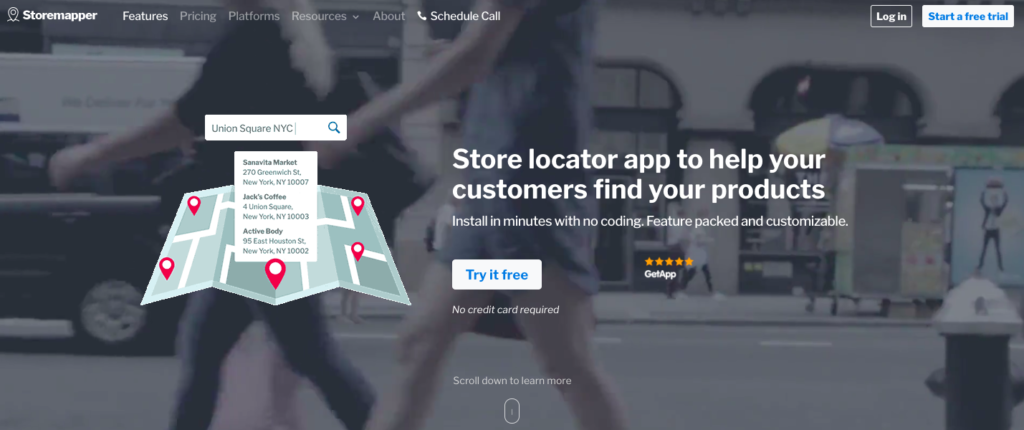
You can use Storemapper to:
- Add a store locator map to your website and mobile application
- Upload store locations from a spreadsheet
- Customize your store locator to match your branding
- Gather analytics for market research
Why you should try Storemapper:
- Make it easy for customers in your area to find your products and services
- No coding needed
- Highly customizable
- Mobile-friendly
- Optimize your marketing efforts with the insights you get from analytics
You can try Storemapper for seven days for free then upgrade to a paid plan that fits your needs. For reference, the Micro plan allows you to add up to 100 locations for just $19/month.
7. Carrd
If you want to build a simple one-page website, Carrd is the perfect fit for you. This tool is popular among entrepreneurs who run a one-man operation for several reasons. It’s intuitive, very affordable, and allows you to build not only a website but also a landing page, a portfolio, or a personal profile page.
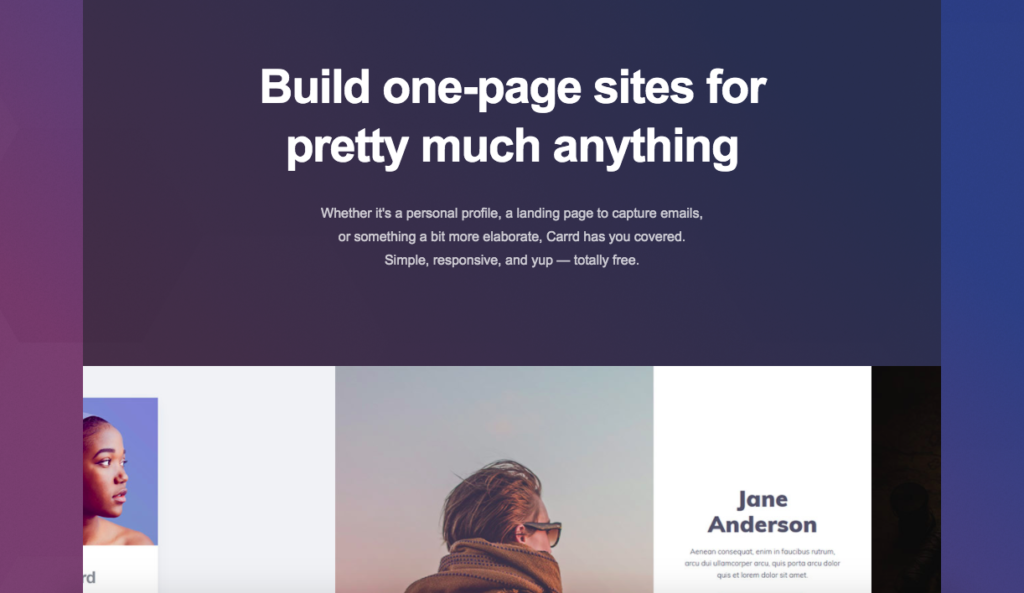
You can use Carrd to:
- Create a responsive one-page site
- Create a “sectioned” site that simulates multiple pages
- Embed custom widgets from third-party websites
- Add contact, sign-up, and payment-enabled forms
- Add social media buttons
Why you should try Carrd:
- Professional look for your one-page site
- Big library of templates
- Highly customizable pages
- Extremely affordable
Carrd works best if you have a simple product or service to offer. You can create up to three sites for free, and the highest-tier plan costs only $49/year, which is less than what you could pay for other tools in a month!
8. Drift
If you are looking for a no-code solution to implement conversational marketing, Drift is a great choice. Drift is a cloud-based tool that allows you to set up live chat windows on your website. Visitors and customers can then have conversations with AI chatbots.

You can use Drift to:
- Build chatbots and voice assistants
- Deliver a personalized user experience
- Conduct A/B tests of messages to optimize conversions
- Generate reports
Why you should try Drift:
- Automate marketing and sales processes
- Generate leads
- Drive more revenue
- Boost the ROI of your marketing budget
- Integrations with 50+ other apps
Drift has a free plan that lets you set up basic chatbots. The paid plans include more features like custom chatbots, conversation analysis, and multiple workspaces to mention a few
9. Typeform
Typeform is another widely used no code tool. There’s even a chance you have used it before. As you may know, Typeform allows you to create highly customizable forms and surveys without coding. For instance, you can add images to make your form feel more conversational. And with the Logic feature, you can build question chains (if a respondent picks X answer, then the form asks Y question) so that respondents won’t have to skip irrelevant questions.
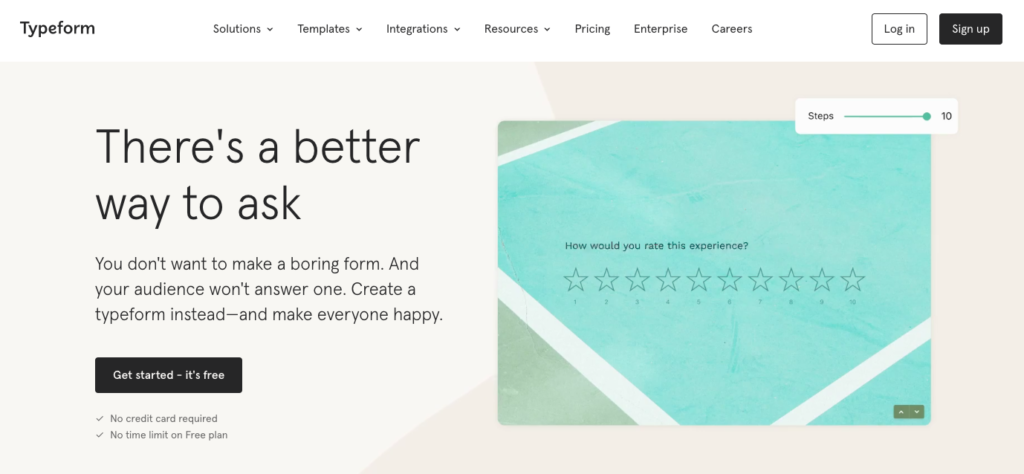
You can use Typeform to:
- Create customer surveys
- Create employee surveys
- Set up contact forms
- Collect reviews and testimonials
- Create lead qualification leads
- Receive applications
Why you should try Typeform:
- Intuitive UI
- Highly customizable forms
- Forms look great and are easy to fill out
- You get more answers – and insights – from your audience
- Numerous integrations with other apps like Mailchimp or Calendly
You can get started for free without a time limit. But to unlock the full power of Typeform, you can sign up for one of the three paid plans, starting at $25/month.
10. Zapier
Last but certainly not least is Zapier, a very popular tool in the business world. There’s a chance you are already using Zapier, and if so, you know how useful it is.
Simply put, Zapier connects your apps so that you can send data from one to the other quickly, easily, and without coding anything. By automating the flow of information between services like Gmail, Dropbox, and Slack, you remove a lot of busy work and streamline your workflows. Customers have described using Zapier as having an additional person in their team who handles many tasks for them.
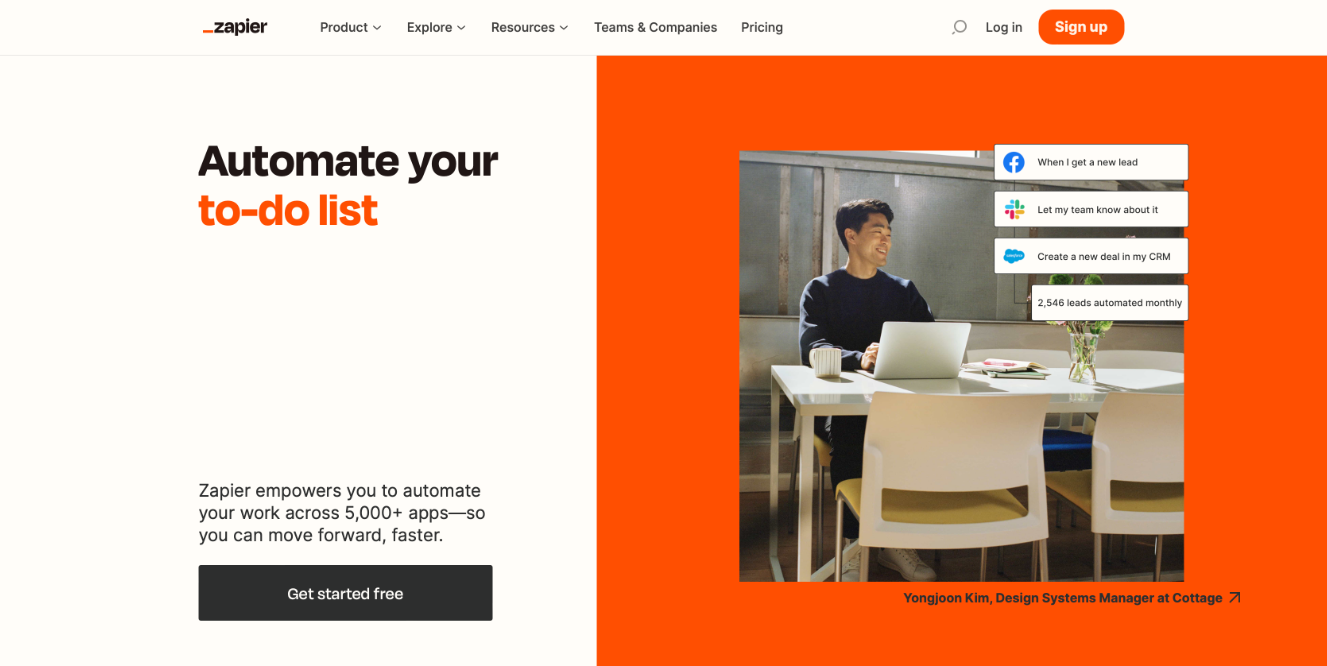
You can use Zapier to:
- Move information between applications
- Build automated processes from a multitude of templates
- Build smart workflows that trigger actions based on conditions
- Receive notifications from different apps in your preferred platform
Why you should try Zapier:
- 3,000+ apps you can link with each other
- Automate routine, low-value tasks
- Secure infrastructure
- Free up the time to do the important work
- You can use the basic features for free forever
- World-class support
Embrace the No-Code Revolution and Grow Your Business
The staggering evolution of low-code and no-code tools has shattered a barrier for non-technical people. Nowadays, you can use intuitive and affordable tools to launch sites, streamline workflows, manage your team, and so much more without learning to code or hiring new developers. Even companies with a technical workforce can use these tools to allow developers to focus on more challenging projects.
By building a no-code tech stack, you will be able to perform tasks easier, communicate better, and free up the time to improve your products and services. Ultimately, you will improve your competitiveness and profitability.
You can get started today with Docparser. If you receive and process documents routinely, Docparser will help you eliminate manual data entry from your workflows by extracting data and sending it to your preferred web app. Sign up for a free trial and try the power of automated data capture.
No credit card required.

